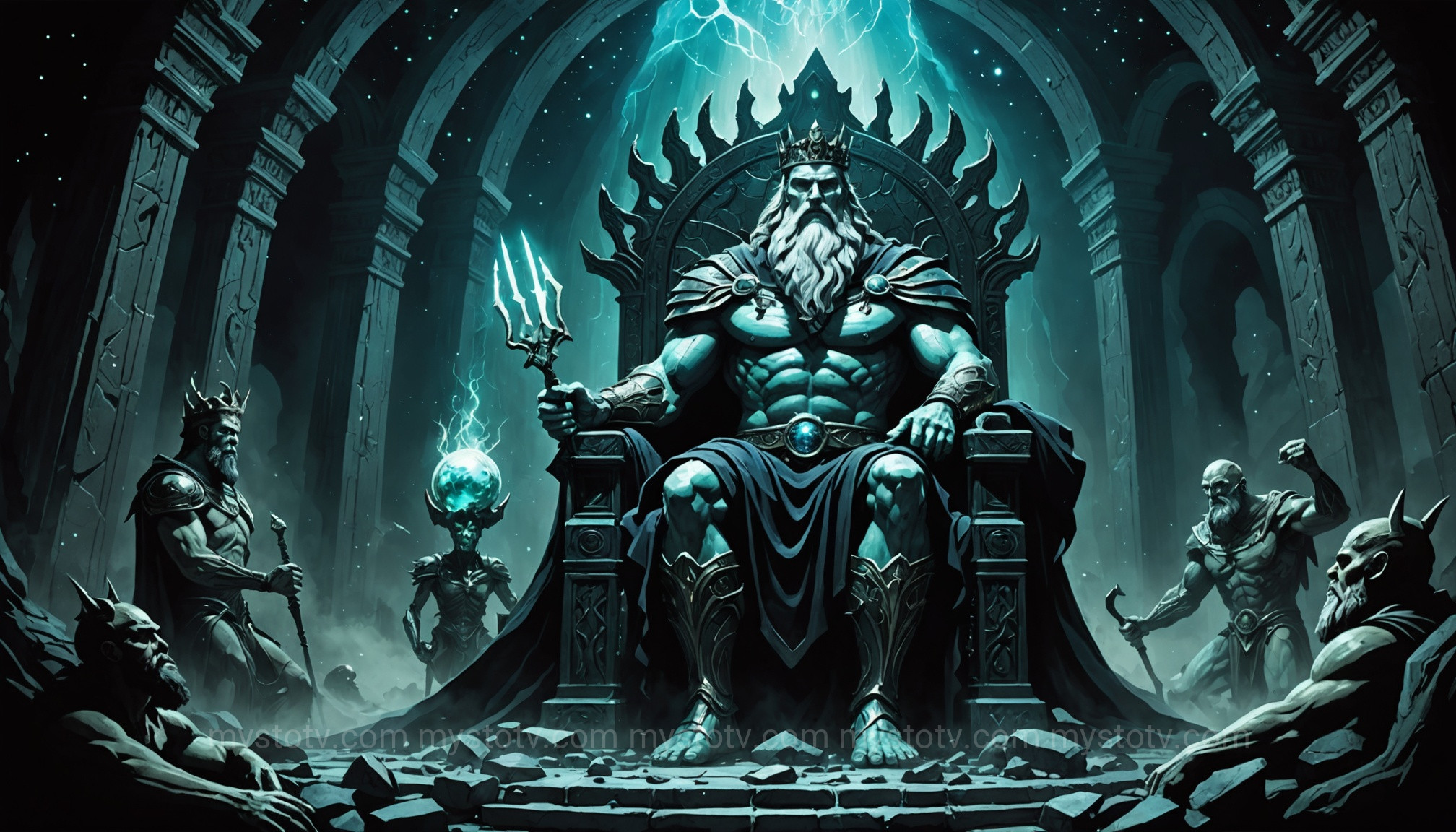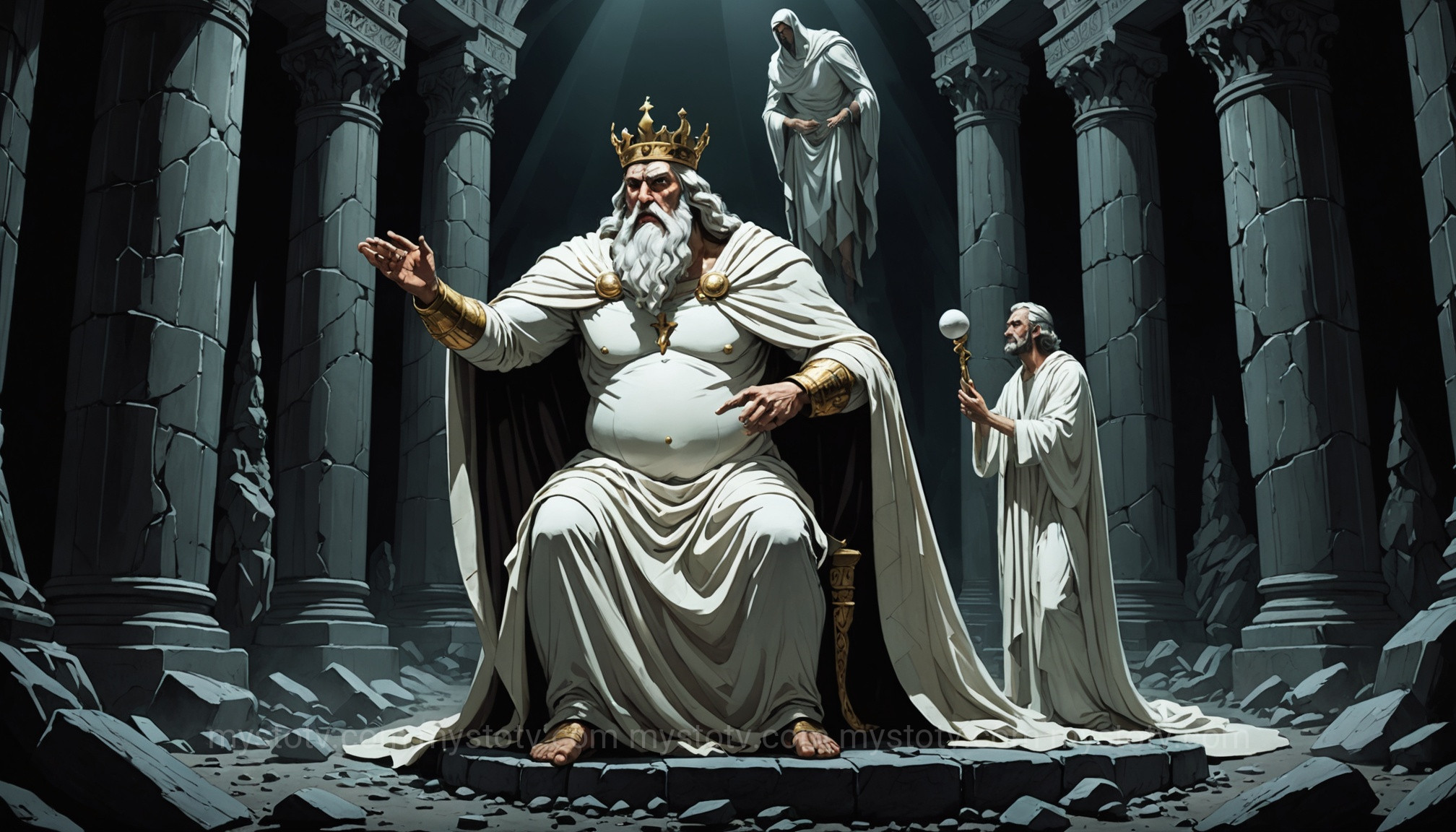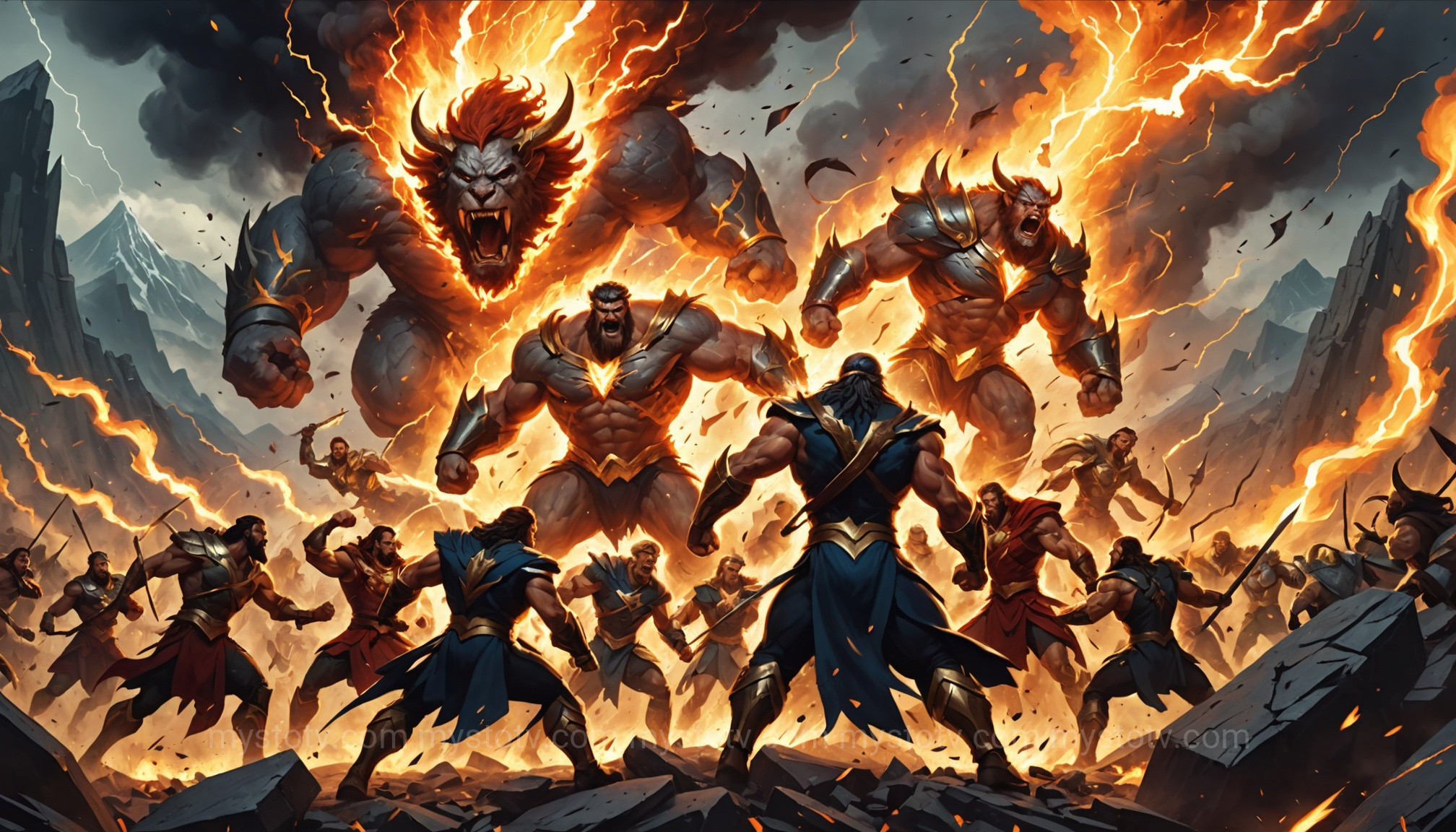I remember the first time I encountered the story of Cronus in a beat-up mythology book as a kid. The image that stuck with me, as it does for most, was of a monstrous father devouring his own children. It was horrifying, primal, and unforgettable. But for years, my understanding stopped there. The story always focused on his terrible act, but the follow-up question, the one that completes the cycle of justice, was often glossed over. The question of how did Cronus die, or if he even could, felt like an unanswered echo. It turns out, his defeat was just as brutal and significant as his crimes, a tale of prophecy, rebellion, and a war that shook the cosmos to its foundations. Understanding his downfall is key to understanding the entire Greek pantheon.
Contents
- 1 The Prophecy That Sealed His Fate: How Did Cronus Die Before He Even Lived?
- 2 The Deception of Rhea: The First Step in How Did Cronus Die
- 3 The Titanomachy: The Epic War That Explains How Did Cronus Die
- 4 The Final Overthrow: The Gory Details of How Cronus "Died"
- 5 Imprisonment in Tartarus: The Eternal Punishment That Defines How Cronus Did Die
- 6 Frequently Asked Questions About Cronus's Defeat
- 7 References
- 8 Conclusion: The End of an Era
The Prophecy That Sealed His Fate: How Did Cronus Die Before He Even Lived?

To truly understand how Cronus met his end, we must first look at how he began his reign: with blood and betrayal. Cronus was the youngest of the twelve Titans, children of Uranus (the Sky) and Gaea (the Earth). Uranus, a cruel and fearful father, had imprisoned his other children, the monstrous Cyclopes and Hecatoncheires (hundred-armed giants), deep within the earth. Gaea, in agony, plotted revenge and fashioned an unbreakable adamant sickle. Only Cronus was brave, or ambitious, enough to take it.
He ambushed his father, and in an act of shocking violence, castrated him with the sickle, tossing the severed parts into the sea. From this act, Aphrodite was born, and Cronus seized the throne as the new King of the Cosmos. However, his dying father and grieving mother uttered a curse, a prophecy that would haunt him for his entire reign: just as he had overthrown his father, so too would he be overthrown by one of his own children.
Analysis: The Self-Fulfilling Prophecy
The question of how did Cronus die is inextricably linked to this prophecy. It became the central, paranoid obsession of his rule. Rather than ruling with wisdom, he ruled with terror, determined to subvert his fate. This fear-driven tyranny is a classic theme in Greek tragedy. His attempts to prevent the prophecy are precisely what set the events in motion for it to come true. By devouring his children—Hestia, Demeter, Hera, Hades, and Poseidon—he created the very grievance that would fuel their desire for vengeance and empower his one surviving son, Zeus, to lead the rebellion. His fate was not an accident; it was a direct consequence of his own character and actions.
The Deception of Rhea: The First Step in How Did Cronus Die
Cronus's wife, his sister Rhea, was horrified. She watched as, one by one, her newborn children were snatched from her arms and swallowed whole by her monstrous husband. The cycle of divine infanticide continued, with Cronus growing more secure in his power with each child he consumed. He believed he had outsmarted destiny. But when her sixth child, Zeus, was born, Rhea could not bear the loss again. Desperate, she sought counsel from her parents, Gaea and Uranus, who helped her devise a plan.
The Omphalos Stone: A Mother's Gambit
Rhea secretly gave birth to Zeus on the island of Crete, hiding him away in a deep cave on Mount Ida. To deceive her husband, she wrapped a large stone, known as the Omphalos Stone, in swaddling clothes. She presented this bundle to Cronus, who, blinded by his paranoia and without a second thought, promptly swallowed the rock. He was placated, believing his final child was now safely imprisoned within him. This single act of deception was the critical first move in the long game that would ultimately answer the question of how did Cronus die.

Zeus's Secret Upbringing and Rise
Meanwhile, Zeus grew to manhood in secret, nurtured by nymphs and guarded by the Kouretes, who would clash their spears and shields to drown out the infant's cries. He was raised with one purpose: to fulfill the prophecy and overthrow the tyrannical father he had never met. When he was old enough, with the help of the Titaness Metis (goddess of wisdom), he began his plot to free his siblings and challenge Cronus for control of the universe.
The Titanomachy: The Epic War That Explains How Did Cronus Die

The overthrow of Cronus was not a single event but a brutal, decade-long war known as the Titanomachy. This cosmic conflict pitted the new generation of gods, the Olympians, against the ruling Titans. It was a war of order versus chaos, of a new dynasty against the old guard. The eventual outcome of this war provides the definitive answer to how did Cronus die.
The Two Factions
On one side stood Cronus and the majority of his Titan brethren—powerful, primal beings representing the untamed forces of the universe. On the other side stood Zeus and his newly freed siblings. After Zeus tricked his father into drinking a special potion (sometimes said to be a mixture of wine and mustard), Cronus violently vomited up his children, who emerged fully grown and armed. First came the stone, then Hestia, Demeter, Hera, Hades, and Poseidon. United by their shared imprisonment and a thirst for justice, they declared war on their father and the Titans who supported him.
The Turning Point: Freeing the Elder Cyclopes and Hecatoncheires
For ten years, the war raged with no clear victor. The power of the Titans was immense. Zeus, realizing he needed greater power, was advised by Gaea to descend into Tartarus, the deepest pit of the underworld, and free the allies his father had long forgotten: the Elder Cyclopes and the Hecatoncheires. Cronus had made the same mistake as his own father, keeping these powerful beings imprisoned out of fear. Upon their release, they pledged their loyalty to Zeus out of gratitude. The Cyclopes, master craftsmen, forged legendary weapons for the Olympians: the Thunderbolt for Zeus, the Trident for Poseidon, and the Helm of Darkness for Hades. The Hecatoncheires, with their hundred arms, could hurl hundreds of massive boulders at once, devastating the Titan ranks. This strategic masterstroke was the beginning of the end for Cronus.
The Final Overthrow: The Gory Details of How Cronus "Died"
With his new allies and divine weapons, Zeus launched the final assault. The resulting battle was cataclysmic. Zeus unleashed the full, untamed power of his thunderbolts, setting the earth ablaze and boiling the seas. The Hecatoncheires rained down mountains upon the Titans, while Hades moved unseen with his Helm of Darkness, creating chaos and confusion. The combined power was too much for the old king.
In most accounts, primarily from Hesiod's Theogony, Cronus was not "killed" in the mortal sense. As an immortal divine being, he could not truly die. Instead, he was utterly defeated, overpowered, and bound in unbreakable chains forged by the Cyclopes. Some versions of the myth, particularly those with Orphic influences, add a layer of symmetrical justice, suggesting that just as Cronus had castrated his father Uranus, Zeus did the same to him before casting him into the abyss. While not universally agreed upon, this version provides a particularly gory and symbolic end to his reign.
Analysis: A Death of Power, Not of Being
So, how did Cronus die? He "died" in the only way that matters for a god: he lost his power, his domain, and his freedom. His death was a political and cosmic one. He was stripped of his authority and cast down from the highest seat of power into the lowest pit of existence. This defeat represented the end of an era of brute force and primal fear, replaced by the new, more structured order of the Olympian gods. The "gory details" are less about a physical death and more about the total and humiliating destruction of his reign.
Imprisonment in Tartarus: The Eternal Punishment That Defines How Cronus Did Die

The final answer to the question of what happened to Cronus lies in his destination: Tartarus. This was not merely the underworld where mortal souls went; Tartarus was a primordial pit located as far beneath the earth as the earth is beneath the sky. It was the ultimate prison for the enemies of the gods—a place of darkness, despair, and eternal confinement.
Zeus cast his defeated father and the other loyalist Titans into this abyss. To ensure they could never escape, he set their former prisoners, the mighty Hecatoncheires, as their eternal jailers. Here, Cronus would spend eternity, stripped of all power and glory, a fallen king in a lightless dungeon. This imprisonment is his mythological death—a complete removal from the world he once ruled.
An Alternate, More Peaceful End?
It's worth noting that a few later traditions, particularly the Orphic myths and works by the poet Pindar, offer a different epilogue. In these versions, Zeus eventually reconciled with his father, released him from Tartarus, and made him the king of the Elysian Fields, a paradise for deceased heroes. While this is a more merciful outcome, the primary and most influential tradition, laid down by Hesiod, is one of eternal punishment. For most of ancient Greek thought, Cronus's defeat was absolute and his imprisonment was final.
Frequently Asked Questions About Cronus's Defeat
1. Was Cronus actually killed or just imprisoned?
In the vast majority of myths, Cronus was not killed in a mortal sense. As an immortal, he could not cease to exist. His "death" was a complete and total defeat, resulting in him being overthrown, stripped of all his divine power, and imprisoned for eternity in Tartarus. His end was a death of his reign and relevance, not his physical being.
2. Who helped Zeus answer the question of how did Cronus die?
Zeus did not act alone. His primary allies were his siblings whom he had freed: Hades, Poseidon, Hera, Hestia, and Demeter. His most crucial allies, however, were the Elder Cyclopes and the Hecatoncheires, whom he freed from Tartarus. The Cyclopes provided the Olympians with their iconic, powerful weapons, and the Hecatoncheires provided overwhelming force that turned the tide of the war.
3. What happened to the other Titans after Cronus was defeated?
The fate of the other Titans varied. Those who fought alongside Cronus, such as Iapetus and Crius, were also cast into Tartarus with him. However, not all Titans opposed Zeus. Some, like Oceanus and the Titanesses (Themis, Rhea, Mnemosyne), remained neutral or even sided with the Olympians. One of the most famous, Atlas, was given a special punishment: to hold up the sky on his shoulders for all eternity.
References
- Hesiod. Theogony. Circa 700 BCE. Translated by Hugh G. Evelyn-White, 1914. https://www.theoi.com/Text/HesiodTheogony.html
- Apollodorus. The Library of Greek Mythology. Circa 1st or 2nd century CE. Translated by Robin Hard, Oxford University Press, 1997.
Conclusion: The End of an Era
The question of how did Cronus die is more complex than a simple story of death. It's a saga of a prophecy fulfilled, of a son's rebellion against a tyrannical father, and of a cosmic war that redefined the universe. Cronus did not die a mortal death; his end was far more profound. He suffered a complete death of power, a brutal overthrow that saw him fall from the ruler of the cosmos to a prisoner in its deepest dungeon. His story is a powerful lesson from Greek mythology: that no rule built on fear is absolute and that even the most powerful beings can be brought down by the cycles of justice they themselves set in motion. His fall wasn't just an end; it was the necessary, violent birth of the age of the Olympians.